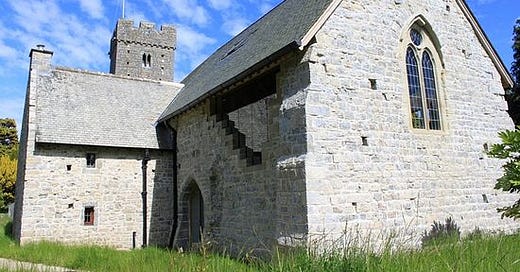Within the last century, there has been a decline in the Christian faith particularly in the Western world. As this may be due to understandable reasons, such as the loss of faith from toxic church environments or the disillusionment caused by fundamentalists at large, these factors and others have resulted in what scholars have dubbed a “post-Christian” society. This is not the complete loss of faith within society, but rather it has lost its importance and has given rise to a more secular and atheist outlook. The emergence of post-Christianity has concerned both scholars and clergy, urging them to determine the cause of this decline and develop strategies to lessen the decline.
While this is a troubling phenomenon within the whole of Western society, this is particularly worrisome within Celtic society – both Gaelic and Brittonic alike. It is not often emphasized enough, but the evolution of insular Celtic civilization into an economic, intellectual, and cultural powerhouse within Europe is largely due to the influence of medieval Christian ideals established by monks. Let’s look at some of these influences and how they have positively impacted Celtic society. If not to consider the good that Christianity offers, this will at least illustrate the importance of the tradition within the isles of Great Britain and Ireland.
First, it is important to address how Christianity had brought education to the isles through the evangelization of monks. As their theology illustrated the need to provide education via the seven classical liberal arts, these iterant and learned figures established early monasteries that served as centers of learning. These centers would later pave the way towards establishing universities, including Scotland’s University of St. Andrews established in 1410 by Augustinian clerics. Their efforts ensured the isles would become a place of learning, producing the various scientists and academics that have formed the intellectual backbone of Celtic society.
With the Protestant Reformation ongoing in the isles, Scripture was translated for the first time from Latin into the various vernacular languages. This provided a twofold benefit to society: the first one opened the ability to read for everyone, as all needed the ability to read so that Scripture could be read and understood individually. The second benefit was the preservation of the Celtic languages, as having them printed in both liturgical texts and Scripture ensured that each language was preserved among the local parishes and families. This simple act allowed for the languages to maintain their relevance despite the attempted ethnic cleansing by the modern English ruling class.
This also allowed for the preservation of indigenous Celtic traditions, such as the filí and bardd present within Gaelic and Brittonic society respectively. While both served as praise poets and genealogists for the aristocracy, they also were part of the early intelligentsia serving as philosophers and mystics. Their religious poems were of significant value, edifying their communities through well-crafted verse and inspiring messages. Despite the elimination of the druid class from Celtic society, figures such as St. Patrick transfigured the filí into a Christian tradition. The Welsh bards continued their craft under a relatively early Christian adoption, including figures such as Taliesin.
The Christian tradition allowed for the elevation of Celtic society from its largely unknown origins into one of the oldest and most esteemed cultures in Europe. Through their early adoption of education and preservation of indigenous cultures, the insular Celts of Great Britain and Ireland have developed into a society that has birthed numerous scientists and thinkers and produced a diaspora in the New World. While most are not aware of their Celtic roots, the names Morgan, Ford, and Carnegie have helped produce the modern world in diaspora in the worlds of finance, automotives, and steel production. Astronauts such as Neil Armstrong and Alan Shepard – both possessing Scottish heritage – did what was once considered impossible by landing on the moon. None of this would be possible without the monks who first thought to evangelize in the furthest parts of Europe.




Question: I have some Scottish and Irish DNA. Does that automatically mean I am Celtic? I would assume not. Peace, LaMon